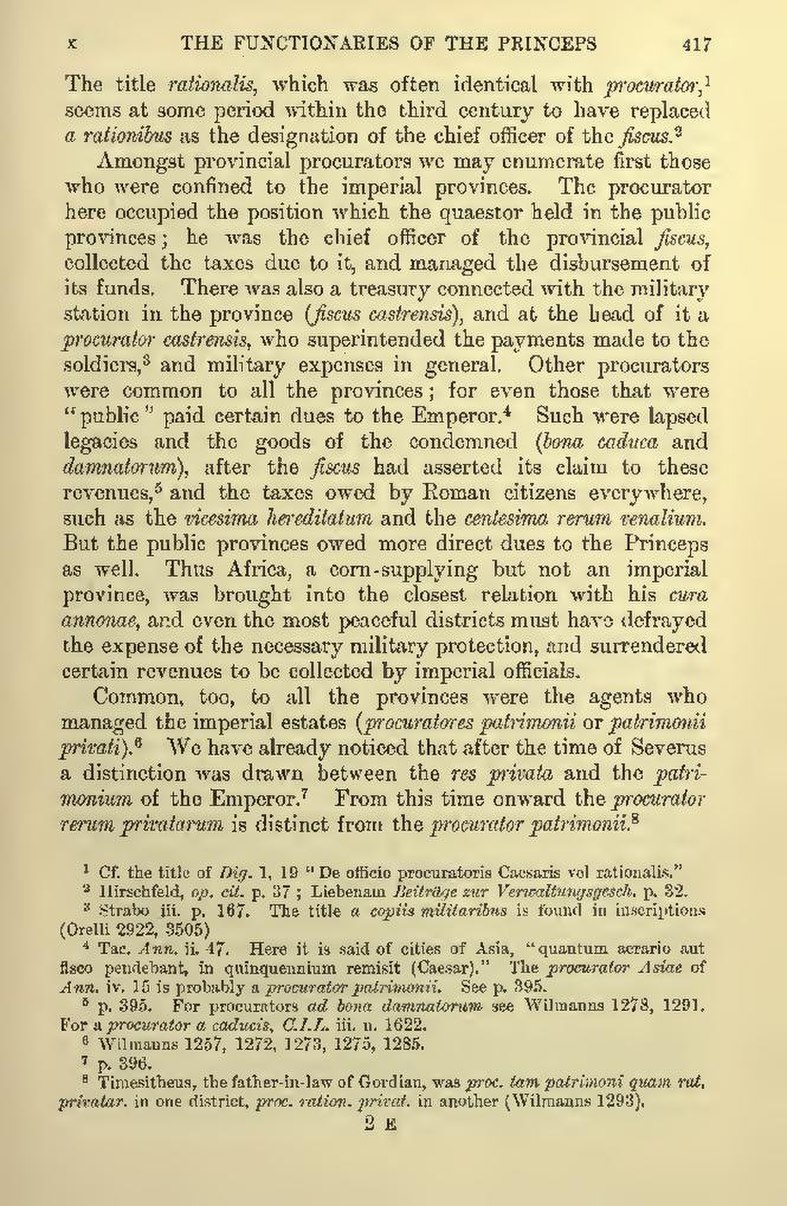The title rationalis, which was often identical with procurator,[1] seems at some period within the third century to have replaced a rationibus as the designation of the chief officer of the fiscus.[2]
Amongst provincial procurators we may enumerate first those who were confined to the imperial provinces. The procurator here occupied the position which the quaestor held in the public provinces; he was the chief officer of the provincial fiscus, collected the taxes due to it, and managed the disbursement of its funds. There was also a treasury connected with the military station in the province (fiscus castrensis), and at the head of it a procurator castrensis, who superintended the payments made to the soldiers,[3] and military expenses in general. Other procurators were common to all the provinces; for even those that were "public" paid certain dues to the Emperor.[4] Such were lapsed legacies and the goods of the condemned (bona caduca and damnatorum), after the fiscus had asserted its claim to these revenues,[5] and the taxes owed by Roman citizens everywhere, such as the vicesima hereditatum and the centesima rerum venalium. But the public provinces owed more direct dues to the Princeps as well. Thus Africa, a corn-supplying but not an imperial province, was brought into the closest relation with his cura annonae, and even the most peaceful districts must have defrayed the expense of the necessary military protection, and surrendered certain revenues to be collected by imperial officials.
Common, too, to all the provinces were the agents who managed the imperial estates (procuratores patrimonii or patrimonii privati).[6] We have already noticed that after the time of Severus a distinction was drawn between the res privata and the patrimonium of the Emperor.[7] From this time onward the procurator rerum privatarum is distinct from the procurator patrimonii.[8]
- ↑ Cf. the title of Dig. 1, 19 "De officio procuratoris Caesaris vel rationalis."
- ↑ Hirschfeld, op. cit. p. 37; Liebenam Beiträge zur Verwaltungsgesch. p. 32.
- ↑ Strabo iii. p. 167. The title a copiis militaribus is found in inscriptions (Orelli 2922, 3505)
- ↑ Tac. Ann. ii. 47. Here it is said of cities of Asia, "quantum aerario aut fisco pendebant, in quinquennium remisit (Caesar)." The procurator Asiae of Ann. iv. 15 is probably a procurator patrimonii. See p. 395.
- ↑ p. 395. For procurators ad bona damnatorum see Wilmanns 1278, 1291. For a procurator a caducis, C.I.L. iii. n. 1622.
- ↑ Wilmanns 1257, 1272, 1273, 1275, 1285.
- ↑ p. 396.
- ↑ Timesitheus, the father-in-law of Gordian, was proc. tam patrimoni quam rat. privatar. in one district, proc. ration. privat. in another (Wilmanns 1293).
